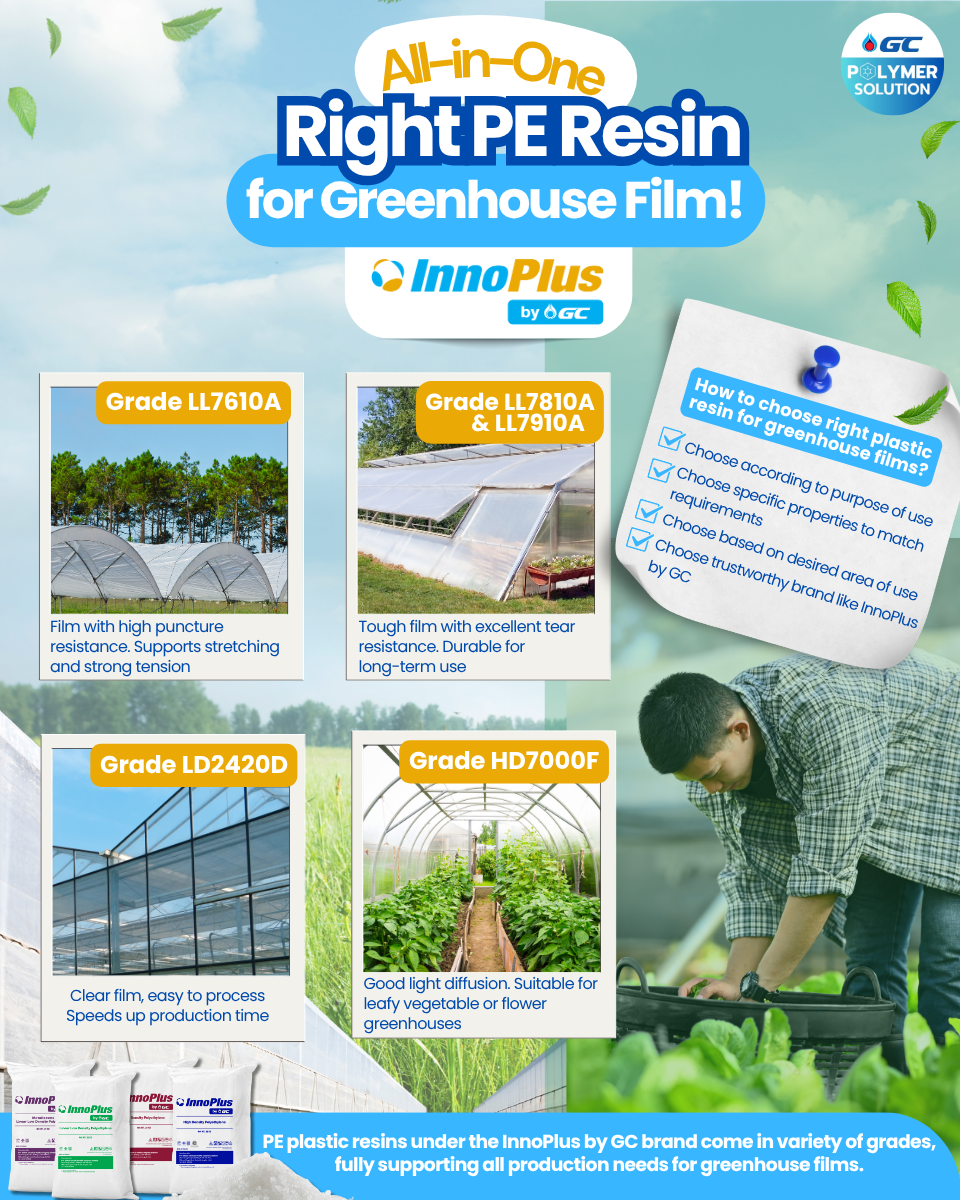The Role of Greenhouse Film in Advancing Thai Agriculture
29 Aug 2025
Climate change has become a significant factor contributing to increased uncertainty in agricultural cultivation, affecting both the quality and quantity of yields. As a result, farmers across many regions in Thailand have started shifting towards modern agricultural technologies to enhance productivity stability. One widely adopted method is the use of greenhouse film designed to create controlled environments essential for plant growth including optimized light exposure, temperature, humidity, and protection from pests and plant diseases.

The development of greenhouse film is based on the fact that plants thrive best under well-controlled conditions. Key factors that directly affect plant growth include exposure to optimal light wavelengths for photosynthesis, relative humidity that supports stomatal opening and transpiration, and regulated temperature that allows for extended growing seasons while minimizing risks from pests and diseases.
In Thailand, the application of greenhouse film has demonstrated clear results across several projects. These films have been used to cultivate highland vegetables, herbs, and ornamental flowers contributing to improved yield and enhanced quality of life for local farmers.
Case Study: Collaboration for High-Quality Greenhouse Film Development
A notable example of successful greenhouse film adoption in Thailand is the collaboration between GC and partners in promoting agriculture in highland areas. The project’s objective is to enhance the cultivation efficiency of cool-climate vegetables by utilizing greenhouse film technology.
As part of this collaboration, InnoPlus by GC polyethylene resin was selected for use in a formulation that combines LLDPE, mLLDPE, and LDPE to produce a film with an optimal balance of clarity, toughness, and flexibility well-suited for the challenging conditions of highland environment.
Key highlights of the greenhouse film developed in this initiative:
• Downgauging: The film thickness was reduced from 150 microns to just 100 microns — a 50% reduction in plastic usage without compromising strength or durability.
• Field-tested Performance: Real cultivation by farmers showed no negative impact on plant growth or yield.
• UV-resistant and long-lasting: Developed to last over three years, even under harsh weather conditions, with strong UV protection and tear resistance.
Currently, these greenhouse films are widely used to grow highland vegetables like lettuce, red oak, green oak, and flowers such as gerbera and roses, all of which are key economic crops in the Royal Project Foundation.
Impact and Benefits:
• 30–50% average increase in yields compared to open-field cultivation
• Reduced chemical and water usage in farming
• Lower long-term production costs due to film durability and reduced plastic resin consumption
• Improved livelihoods for highland farmers through better-quality harvests and increased income
This case study showcases the potential of tailored greenhouse film technology developed to meet Thailand’s agricultural context combining innovative design, high-performance materials, and sustainability.
As Thailand’s leading plastic resin producer, GC has developed a range of InnoPlus by GC grades specifically engineered for greenhouse film production. These include:
• LL7610A – High tear resistance, withstands wind and mechanical stress
• LL7810A / LL7910A – High toughness for extended film lifespan
• LD2420D – High clarity of film with easy processing, reducing production time
• HD7000F – Even light diffusion, supporting optimal plant photosynthesis

These resins can be blended to enhance the film’s performance and enable downgauging, which aligns with both business efficiency and environmental sustainability.
Greenhouse film represents a strategic solution to strengthen Thailand’s agricultural productivity enabling food security, yield quality control, and long-term sustainability. The success of such systems relies heavily on the use of high-quality materials, particularly PE resins specifically developed by GC, which are optimized for demanding agricultural conditions. Through innovation and collaboration, GC continues to play a vital role in supporting sustainable farming practices in Thailand.
For more information about our products or inquiries, please fill out the contact form

